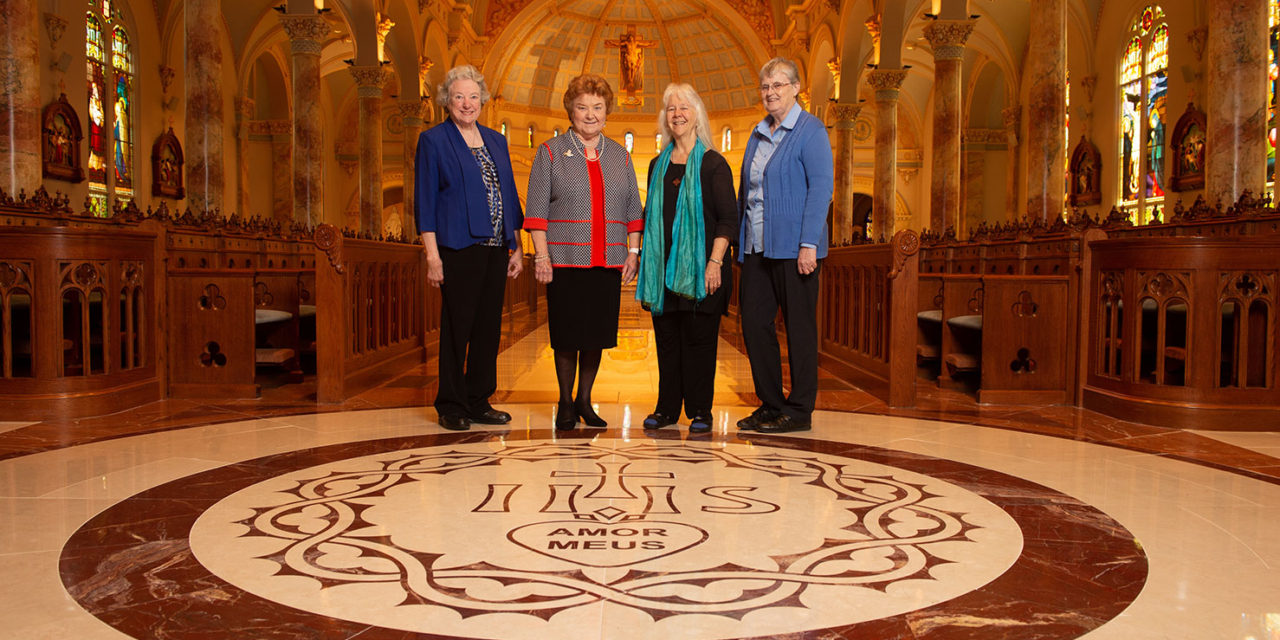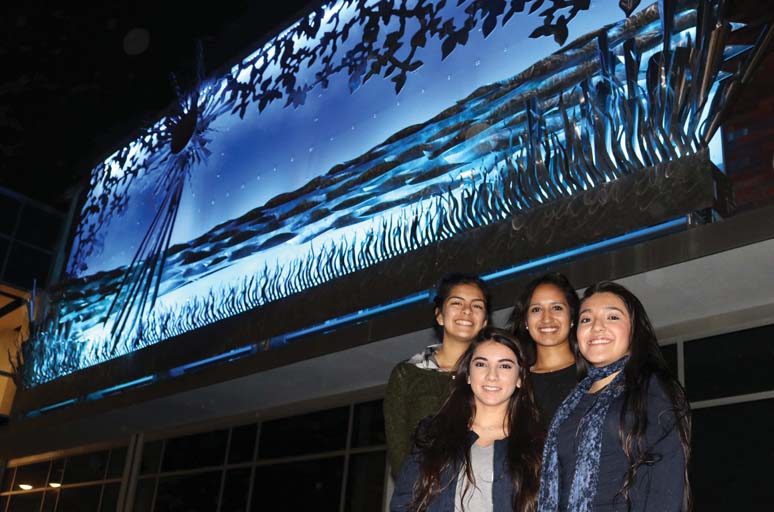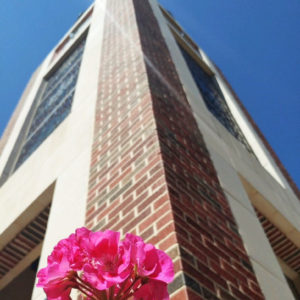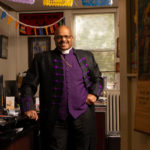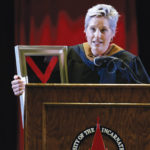For the Sisters of Charity of the Incarnate Word (CCVI), and indeed for every life their congregation has touched, this spring marks a time of celebration. In March, the CCVI Sisters opened their jubilee year marking the 150th anniversary of the congregation’s founding. At the year’s opening Mass – the first of several festivities planned throughout their jubilee year – people filled the Chapel of the Incarnate Word to capacity to give thanks to God and to honor the congregation that has impacted the lives of countless people for generations.
Presided by Archbishop Gustavo García-Siller, the Jubilee Mass celebrated the founding of the congregation and the charism of the Sisters, their good works, their vision and the impact they have made throughout their history and continue to make today.
“Sisters, I commend you because you are Vatican II, you have moved forward, have experienced renewal in your own communities and those you have served, you have expanded and now you are looking toward the future as a congregation,” said Archbishop García-Siller. “May the fruit of God’s love in you continue helping us to be the Church and to be the world God always had in mind.”
Since its earliest days, the Sisters at the University of the Incarnate Word have been preparing students, staff and surrounding community to be just that. Through their mission, approach to education and focus on service, they plant the seeds of good works in students, faculty, staff and the surrounding community so they may go on to be the Word in the world.
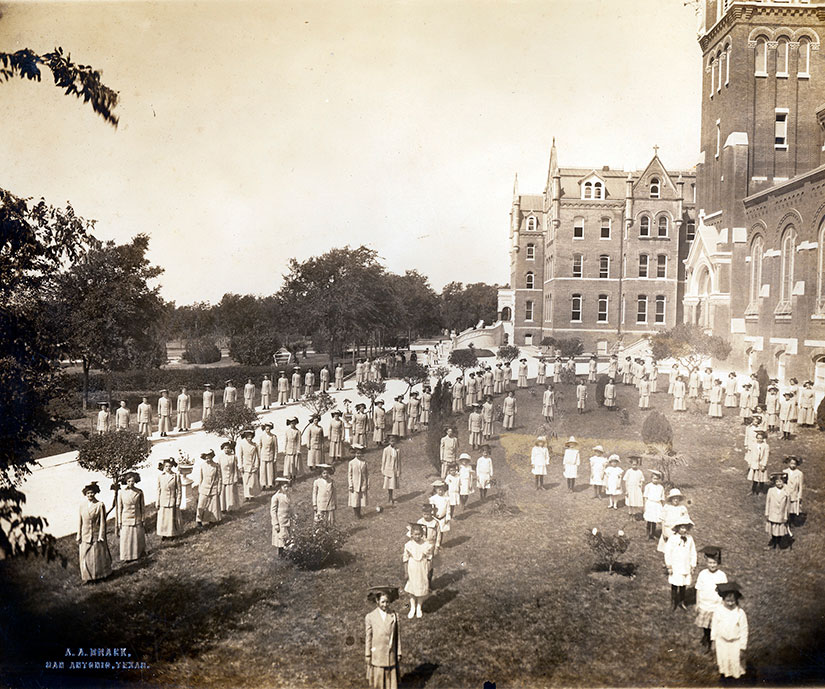
Students form the college acronym, IWC. Photo courtesy of the Sisters of Charity of the Incarnate Word Archives.
Heritage and Legacy
“Duty calls us to take two loving looks, one toward our heritage and one toward our legacy,” said Sr. Teresa Maya, CCVI, congregational leader, as she declared the Sisters’ sesquicentennial year open during the Mass. “If heritage is what we receive, legacy is what we leave.”
A loving look at UIW’s campuses makes it readily apparent that this rich heritage is alive. Buildings bear the names of Sr. Columkille Colbert, CCVI, who served as president and chairman of the board for 40 years,
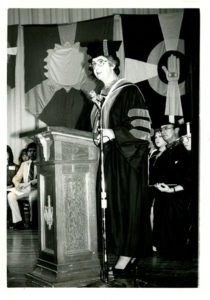
Sr. Margaret Patrice Slattery, CCVI, former IWC president, speaks at commencement,
1981. Photo courtesy of the Sisters of Charity of the Incarnate Word Archives.
Sr. Mary Elizabeth Joyce, CCVI, professor emerita of fashion, and Sr. Antoninus Buckley, CCVI, board member, registrar and professor of education. Students, faculty and staff can recite from memory the story of the first three French Sisters who answered the call from Bishop Claude Dubius to care for the sick and the poor. Former students remember the leadership of professor, dean, president and chancellor Sr. Margaret Patrice Slattery, CCVI, the laughter of professor emerita of music Sr. Maria Goretti Zehr, CCVI, the insight of chancellor emerita Sr. Helena Monahan, CCVI, and the compassion and determination of Sr. Dorothy Ettling, CCVI, for whom the Ettling Center for Civic Leadership & Sustainability is named, among many others. Members of the community attend the lecture series named for Sisters who were leaders in their fields, such as Srs. Charles Marie Frank, CCVI, and Margaret Lucilla Curry, CCVI. This is a community that knows the UIW Mission by heart.
This heritage, however, is perhaps most apparent in UIW’s culture and its everyday life. Four Sisters who currently work as University educators and administrators, Sr. Walter Maher, CCVI, Sr. Kathleen Coughlin, CCVI, Sr. Martha Ann Kirk, CCVI, and Sr. Eilish Ryan, CCVI, shared insights on their work in fostering this culture, educating students, establishing opportunities, instilling core values and keeping the Mission at the heart of this community of faith and education
“If I could only teach two things, I would teach compassion and creativity,” said Sr. Martha Ann Kirk, CCVI, professor of Religious Studies. “Our early sisters had creativity and compassion. There are such great needs in the world, so we are creative. Let’s bring together new groups, new opportunities, new possibilities. Every challenge is an invitation to be creative.”
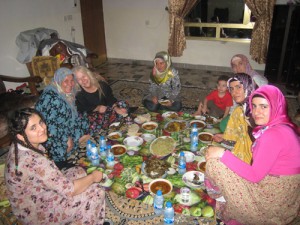
Sr. Martha Ann Kirk enjoys a feast in northern Iraq during her research study on peace building efforts by Muslims inspired by Fethullah Gülen.
Since their earliest days, Incarnate Word Sisters have readily accepted new challenges as they arose – first caring for the sick and the poor, then for orphans, and later educating children left in their stead. They approached them with ingenuity and stretched to do what was needed, said Kirk.
Over the length of her tenure as an educator, Kirk has worked to impart those qualities in the students – which she estimates at nearly 7,000 – with whom she has worked. In the classroom, in Campus Ministry, which she helped develop, via service learning endeavors or on international study trips, students are stretched in their understanding of the world, their preconceptions dispelled and challenged to approach the needs of our day in the same spirit as the early sisters.
“Though students may graduate from Incarnate Word, may they graduate more open minded and open hearted,” she said. “It’s been my beautiful experience that I so frequently meet people who remember me from 20, 30, 40 years ago and in our conversations, I pick up that they are more open minded and open hearted because they came here. That makes me very grateful as an Incarnate Word Sister.”
In addition to working directly with students, Kirk has served as the co-director of the mentoring program for new full-time faculty since 1998. In the hiring of faculty and the formation of faculty, they are given opportunities for education in justice, peace and care of creation. They are then encouraged to share them with students. “As they are educated in these values, they will encourage their students in them.”
Formation and Transformation
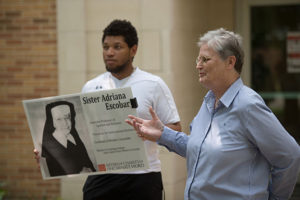
Sr. Walter Maher, CCVI,
educates students on CCVI history.
For Sr. Walter Maher, CCVI, vice president for Mission & Ministry, forming the faculty in Mission is a critical part of building the UIW culture. Since 2000, Maher has organized retreats offering faculty an opportunity to explore social justice and ethics, and reflect on the intersection of Mission and their fields of study, and engagement with the students.
“We get at the real issues of the world and how they are impacting the University,” she said. “We are in the world because the world is in the University. It comes in the door every morning in different shapes and sizes.”
In her role, Maher also hosts similar opportunities for administrators, coaches, administrative assistants and staff members across campuses. With each retreat, the hope is that participants are strengthened in their dedication to the Mission, and use it as a conduit for theological reflection and to ask the deeper questions of life.
“Helping faculty and staff to open minds and hearts and then be able to talk about it and integrate it, that is when the transformation happens,” she said.
“That’s really my ultimate goal, that faculty and staff will engage in these conversations. It doesn’t have to come from me, but once you spark the light, let it glow,” she said. “If we can stay fed in the Word of God, then we can stay connected to the Mission and be responsive to the needs of the community.
Serving the World and the Church
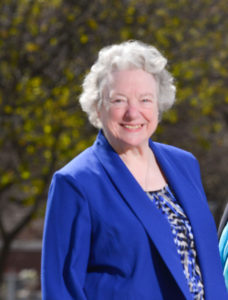
Sr. Eilish Ryan, CCVI, in February 2019
As the needs of the community have changed, so have those of the Church. Sr. Eilish Ryan, CCVI, professor emerita of Religious Studies, served as a former director of UIW’s Pastoral Institute (PI) for many years. Opened in response to a mandate of the Second Vatican Council for the education of lay persons in theology and ministry, PI had at first a student body of largely religious Sisters who needed to be well versed in Vatican II teachings in their new ministries.
Gradually more and more lay people began to seek pastoral education.
“The change was coming in two directions, from the changing needs of the Church and from the student population,” she said. “One of the things about education is that you always have new students and new students bring new life. We kept adapting to the needs of the Church and of the students”
A focus in youth ministry through a collaboration with the Archdiocese was added to the academic offerings. Later, graduate courses in spirituality and ministry were introduced. In partnership with the Mexican American Catholic College, a BA in Pastoral Ministry was established preparing young people to become catechists, ministers, chaplains or other roles in Catholic leadership.
“Participating in the development of the BA in Pastoral Ministry was one of my happiest achievements,” she said. “Through education, we have the opportunity to contribute to a better world by endorsing and encouraging foundations in faith, service, and social action.”
Making More Possible
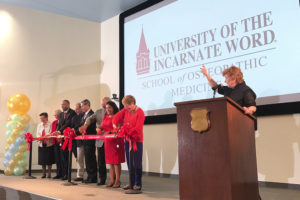
Sr. Kathleen Coughlin, CCVI, signals city leaders, physicians and faculty to cut the ribbon signaling the opening of the School of Osteopathic Medicine.
Creating pathways and opportunities for students to be educated and formed in the Incarnate Word is what Sr. Kathleen Coughlin, CCVI, senior advisor to the president for leadership gifts and sponsored ministries, has worked to make possible for years. The former nurse, hospital administrator, CEO and president of the Catholic Health Association of Texas, also served as UIW’s vice president for Institutional Advancement, and in that role led the development efforts that helped establish new programs and schools.
“The exciting thing about being in development is the story we have to tell about the university, our past, our present and the plans we have for the future,” said Coughlin. “We stand on the shoulders of those who went before us, and the ability to share the story of what they helped to build was a real gift.”
With her expertise in health care, she brought critical knowledge to the establishment of the Feik School of Pharmacy, the Rosenberg School of Optometry, the School of Physical Therapy, the expansion of the Ila Faye Miller School of Nursing and Health Professions, and ultimately the School of Osteopathic Medicine.
In her current role, she’s a principal collaborator, finding or creating mutually beneficial opportunities with other CCVI sponsored ministries.
“The Sisters are blessed in that we have 11 sponsored ministries, and we work with those who oversee them to make the mission come alive,” she said. Today, Coughlin is working with the sponsored ministries to develop a mission certification program for lay people and with CHRISTUS Health to increase internships for pharmacy students and offer opportunities for medical school students. Working with lay collaborators is one way the Sisters are keeping the Mission alive into the future, she said.
Just as in the past 150 years, the next years will surely present many changes and challenges that will require the work of many hearts and hands, creative and compassionate responses, thoughtful reflection and partnerships with institutions, students, faculty and lay people invested and formed in the mission. As Sr. Teresa Maya said: “This jubilee belongs to everyone.”

